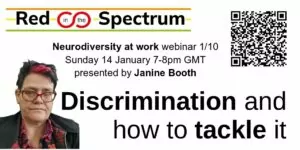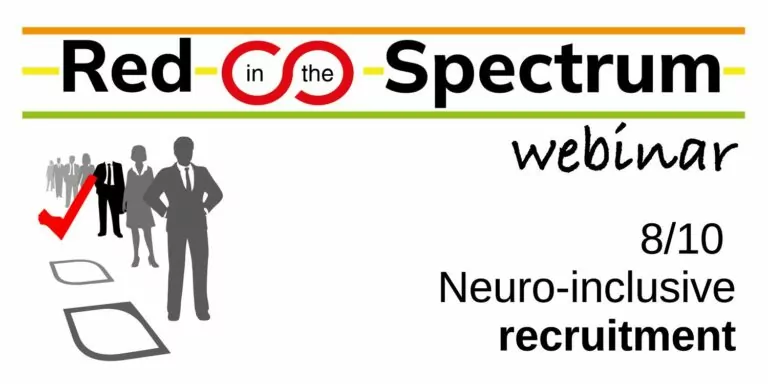Discrimination and how to tackle it: Webinar 1
Yesterday (Sunday 14 January), Red in the Spectrum held the first of our series of ten Sunday evening Neurodiversity at Work webinars, on the subject of ‘Discrimination and how to tackle it’.
People from a variety of jobs and work locations attended, sharing their experiences of discrimination and learning strategies for tackling it.
The webinar involved an illustrated talk, with questions, comments and discussion after each section.
Discrimination in numbers
- Neurodivergent workers feel more vulnerable to disciplinary action. (Bewley & George, 2016)
- People with ADHD are twice as likely to have been dismissed from a job than people without. (AttentionUK)
- 7% of working-age autistic adults are in paid work, the lowest rate of all disability categories, under half the rate of disabled people generally, and around a quarter of the 81.3% of non-disabled adults in work. (ONS, 2021)
- Significant under- and unemployment of autistic people causes poor long-term outcomes for autistic adults. (Howlin and Magiati, 2017)
- In a 2016 poll, 64% of respondents voluntarily disclosed their dyspraxia to their employer, but only 33% actually received any specific advice or support. As a result, dyspraxic employees were at risk of underperformance or losing their job. (Dyspraxia Foundation)
Discrimination in cases
Meseret Kumulchew
- Starbuck’s supervisor
- dyslexic, asked for help, received none
- mistakenly entered wrong information
- accused by employer of falsifying documents
- given lesser duties and told to retrain.
Andrew Beck
- autistic and has learning difficulties
- worked as a golf club green keeper since 1986
- new head green keeper appointed in 1999, who
- told him to wear highly visible clothing and a red cap
- banned him from using a motorised vehicle
- gave him an unfair amount of heavy work
- knocked a rake out of his hands, pushed and swore at him
- accused him of not pulling his weight
- gave him a verbal warning for failing to carry out tasks
- gave him a child’s game as his staff Christmas present.
- In 2007, Andrew resigned because of effect on his health.
Kathy
- does not drive, takes longer to get ready for work, finds crowded buses stressful, has been late for work a few times.
- told her manager that she is dyspraxic, but he:
- did not know what dyspraxia is and did not find out
- told her not to make excuses for poor performance
- threatened disciplinary action
- refused her request to change hours from 9-to-5 to 10-to-6
- noise and light at work distract her
- has to work late and take work home in order to catch up
- work stress increasing the number of mistakes she makes
- has made an appointment to see her GP about stress / anxiety.
Discrimination: Ten ways in which workplaces disable neurodivergent workers
- Getting a job
- ‘starting behind the starting line’
- lack of help in finding the right job
- jobs not advertised
- job adverts
- interviews
- Getting on with the job
- induction
- training / learning styles
- overlooking our strengths
- promotion
- Communication
- Autistic people may communicate differently from non-autistic people.
- Dyslexic people may prefer alternatives to written communication.
- Workplaces usually assume neurotypical methods of communication, disadvantaging those who communicate better in a different style.
- Social interaction
- so much of it!
- teamwork
- ‘fitting in’
- insistence on eye contact
- Sensory issues
The workplace environment is usually geared to typical sensitivities, causing distress to
- people with intense or unusual sensitivity to: bright light, sound, texture, heat/cold, colour, etc
- or who find it difficult to work in conditions which are: over-stimulating, cluttered, busy, congested, cramped
- Organising work
- distraction
- interruption
- time management
- pace of work
- perfectionism
- The trouble with managers
- lack of knowledge
- favouritism
- disruptive supervision
- bossiness!
- managing performance
- managing attendance
- Bullying, harassment, discrimination
- mocking, belittling
- excluding socially
- eccentric / ‘weird’ / stimming
- staying in the closet
- All change!
- disruption to schedule
- changes to ways of working
- major reorganisations
- imposed change
- Job insecurity in a time of austerity
- temporary, casual, zero-hours contracts
- job cuts, redundancies, unemployment
- short-staffing, pressure
Tackling discrimination: Making the workplace more neurodiversity-friendly
- adjustments for individuals
- changes to the workplace
Tackling discrimination: Identify barriers -> remove barriers
- a couple of examples of measures to tackle each of the above ten points.
- Getting a job
- neuro-inclusive recruitment processes
- Getting on with the job
- training using different learning styles
- mentoring
- Communication
- instructions and information in the format of the worker’s choice eg. verbal, written, demonstration
- all printed materials to be in dyslexia-friendly layout
- Social interaction
- provide quiet spaces to work
- no insistence on eye contact
- Sensory issues
- replace fluorescent lighting with full-spectrum lighting
- provide noise-cancelling headphones
- Organising work
- maximum workers’ control over method of work
- provide visual calendars, digital organisers and other assistive materials
- The trouble with managers
- mandatory neurodiversity training for all managers
- amend (or scrap) performance and attendance management procedures
- Bullying, harassment, discrimination
- facilitate stimming
- take action against bullies
- All change!
- daily routine not to change unless unavoidable
- all reorganisation to be negotiated with workers via their trade union
- Job insecurity in a time of austerity
- employ workers directly, on permanent contracts
- adequate staffing levels and manageable workloadHow neurodivergent workers and allies can tackle discrimination
How neurodivergent workers and allies can tackle discrimination
Campaigning together
- talk with workmates
- identify the discrimination that you want to tackle
- identify a measure that you want your employer to implement
There is power in a union
- join a trade union
- discuss neurodiversity at a union meeting
- the union can raise your demand in
the collective bargaining procedure
Discrimination against individuals
- is anyone else affected?
- grievance: individual or collective
- defence against disciplinary action
- reasonable adjustments
- union representation
Campaigning
- petition
- protest
- allies
- public support
- industrial action

The law
- some discrimination is unlawful, some is not
- legal process is free, but lengthy and difficult
There are nine more webinars in the series – you can attend whichever ones are most interesting and relevant to you.
All webinars take place on a Sunday at 7pm, and last one hour.
- Workplace changes and reasonable adjustments, Sunday 21 January, 7-8pm
- To tell or not to tell?, Sunday 28 January, 7-8pm
- Neurodivergent workers’ legal rights, Sunday 4 February, 7-8pm
- Discipline, attendance, performance management, Sunday 11 February, 7-8pm
- Neurodivergence and other identities, Sunday 18 February, 7-8pm
- Working carers’ rights, Sunday 25 February, 7-8pm
- Neuro-inclusive recruitment, Sunday 3 March, 7-8pm
- Neurodiversity as a health and safety issue, Sunday 10 March, 7-8pm
- There is power in a union, Sunday 17 March, 7-8pm
The series has got off to a great start, so whether you attended this week or not, we hope to see you at some point over the next nine weeks.
Next week, we will be discussing Workplace Changes and Reasonable Adjustments, and you can register here.











